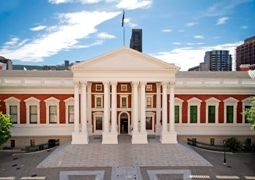
The National Council of Provinces (NCOP) was likened to a vast laboratory by the late and the former Deputy President of the former Senate (The second House of the transitional Parliament) Mr Govan Mbeki, the Chairperson of the NCOP Ms Thandi Modise told Members of Parliament and the invited guests at Parliament today.
Ms Modise said according to Mr Mbeki, the NCOP was viewed as a vast laboratory by the people to carry out experiments on how the House could bring all the people of South Africa together – and on how the House could get messages from the top to percolate through the human layers of South African society to the lowest layers.
Ms Modise spoke at the launch of the 20th Anniversary of the Constitution and the establishment of the NCOP in the National Assembly. She explained the shift from the old second House of Parliament that was retained by the 1993 Interim Constitution to the current NCOP.
In explaining the shift, Ms Modise said the 1993 Interim Constitution of the Republic of South Africa made provision for two Houses of Parliament, the Senate and the National Assembly. “You may recall that the Senate was the Upper House of the Parliament of South Africa between 1910 and 1991 and between 1994 and 1997. In 1981 it was replaced with the President’s Council. Later the 1983 Constitution established the Tricameral Parliament which operated from 1984 to 1994. Today we are talking about the shift from the 1994 Senate to the NCOP which came into effect in 1997,” said Ms Modise.
She said the Interim Constitution provided a loose mandate for the Senate. As such, according to Ms Modise, the Senate shared the legislative authority over the Republic with the National Assembly as the constituent parts of Parliament. She said the Senate might not amend any Bill in so far as it appropriates revenue or money or imposes taxation (that is, Section 60 (6)). “However, it had a specific role in relation to Bills affecting the boundaries of the provinces or the exercise or performance of the powers and functions of the provinces,” she said.
She said the crafting of the Constitution which is celebrated this year, resulted in a range of considerations which included that South Africa would have a democratic and co-operative, intergovernmental system. “Parliament would become far more people-centred and dynamic. It was thus felt that the Senate would not be able to meet the needs of this new institution,” she said.
The NCOP was created to serve a rather distinct role. Its mandate was to represent the provinces to ensure that provincial interests were taken into account in the national sphere of government. It was to do this mainly by participating in the national legislative process and by providing a national forum for public consideration of issues affecting the provinces. The Constitution also made provision for the representation of organised local government in the NCOP, but with no voting status.
“Unlike the Senate, only six out of the 10 delegates were to be permanent. The rest were to interact with the House while sitting in the provincial legislatures (that is, special delegates). This represented a dynamic link between the provinces and the NCOP,” she said.
By Mava Lukani
3 March 2017

